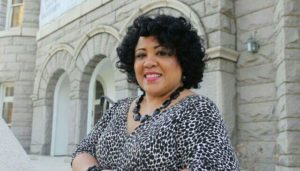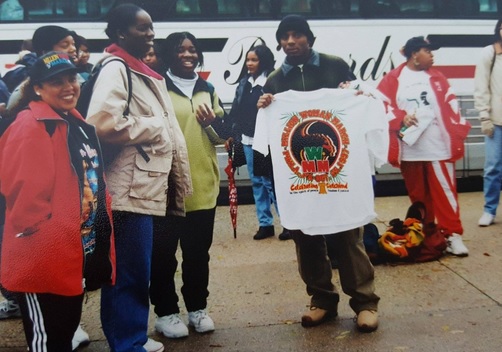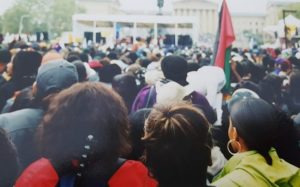 Melody M. Pannell currently serves as assistant professor of social work at Eastern Mennonite University. It is her life mission to embody practical theology through the values and ethics of social work and encourage those that she serves to engage in a transformative journey of emancipatory hope in action and empowerment through holistic, therapeutic and restorative ministry. Melody is also the founder and executive director of The Destiny’s Daughters Empowerment Ministry LLC. and the assistant executive director of Men About Positive Purpose LLC, a spiritual empowerment and personal leadership development program that strives to assist adolescents and young adults to evolve into persons of good character and integrity, to enable them to overcome challenges and to realize their God–given purpose through therapeutic mentorship, spiritual formation and community organizing. Melody will also be a speaker at Orlando 2017. This is the first part in a two part series where Melody shares insights from her lived experiences that lead her to participate in the upcoming Women’s March on Washington.
Melody M. Pannell currently serves as assistant professor of social work at Eastern Mennonite University. It is her life mission to embody practical theology through the values and ethics of social work and encourage those that she serves to engage in a transformative journey of emancipatory hope in action and empowerment through holistic, therapeutic and restorative ministry. Melody is also the founder and executive director of The Destiny’s Daughters Empowerment Ministry LLC. and the assistant executive director of Men About Positive Purpose LLC, a spiritual empowerment and personal leadership development program that strives to assist adolescents and young adults to evolve into persons of good character and integrity, to enable them to overcome challenges and to realize their God–given purpose through therapeutic mentorship, spiritual formation and community organizing. Melody will also be a speaker at Orlando 2017. This is the first part in a two part series where Melody shares insights from her lived experiences that lead her to participate in the upcoming Women’s March on Washington.
A perspective on the Women’s March on Washington as a radical Anabaptist womanist

Melody Pannell (left) together with others at the 1997 Million Women March
On October 25, 1997, an estimated 750,000 African-American women gathered together to march on the Ben Franklin Parkway in Philadelphia, Pennsylvania for The Million Women March. I am proud to say that I was counted in that number. I had just graduated with a degree in social work from Eastern Mennonite University and was serving there as a graduate assistant in the Office of Multicultural Services. I remember being filled with such excitement, determination and resolve. I was joining my voice and body as a woman of color in solidarity with other black women from across the nation to raise awareness about racial injustice and advocate for the rights of black women, black families and the communities in which we lived. I traveled by charter bus on that rainy day from Harrisonburg, Virginia, with undergraduate students from the Black Student Union and other leaders from the Harrisonburg community. However in my heart, I was representing my native hometown of Harlem, New York.
It was a day of unity, inspiration and empowerment that fueled my faith and sense of hope as a young woman of color. I was on the road to evolving as a social justice advocate and developing my own voice from the margins.

The Million Women March, 1997
Fast forward to the morning of Tuesday, Nov. 8, 2016. I arose with a sense of purpose, responsibility and anticipation. I was going to exercise my right to vote, a right that previous generations of women and African-Americans had given their lives for. The intersections of my identity as an African-American woman created a sense of urgency at the core of my being. I also carried within my soul the white heritage of my Mennonite German-Swiss mother. My mother married my African-American father in the heart of Harlem at Seventh Avenue Mennonite Church in 1964 during the height of the civil rights and black power movements. Although they married in New York, interracial marriage was still illegal in the state of Virginia until 1967 (Loving vs. Virginia) and children born from an interracial union were considered “illegitimate.”
I have always been aware that although I was birthed from a white woman, society has never allowed me to “live in the center.” I was placed in the margins of society the moment that I took my first breath. Yet, I believed that God had a purpose for me to be born in the manner in which I was created for such a time as this. It is a significant part of my spiritual mission to transform self and society through racial healing and justice.
As a biracial woman from the north, now living in the south for over 10 years, I consider the words of feminist author bell hooks. She says, “The politics of location, necessarily calls those of us who would participate in the formation of counter-hegemonic cultural practice to identify the spaces where we begin the process of re-vision.”[i] Where I choose to stand and offer my voice within the culture of domination is a deliberate and strategic choice. “To be in the margin is to be a part of the whole but outside the main body,” hooks says.[ii]
The results of the election were almost debilitating for me, especially as I wrestled with the differing views, surprising political stances as well as “loud silence” from the Christian community. As an African-American woman, the psychological effects of the widespread acceptance of our president-elect’s mindset and behavior was compounded by historical trauma, post-traumatic slave disorder, recent incidents of police brutality and “whitelash,” in response to the first Black President. The election results were a harsh reminder that I was indeed still on the margins of a society that spoke from the center of power, privilege and patriarchy. They were also a reminder that the reasons I marched 20 years ago were even more relevant today than ever before.
A few days after the election, in a conversation with my sister, who lives in Harlem, we attempted to grasp this new reality in preparation for what we feared would be a significant shift in policies and practices that would push the oppressed and historically marginalized further out into the margins. My sister shared that she and my niece, a millennial, Anabaptist woman of color, wanted to attend what was being called, the “Million Women March.” She also said that our white Anabaptist cousin and her millennial daughters from Lancaster County, Pennsylvania wanted to march too. I was already considering participating, but now I was thrilled at the idea of marching with my family as we embodied generational and cultural diversity. I made plans for us to march together in Washington, D.C. We would be coming from New York City, Elizabethtown, Pennsylvania and Harrisonburg, Virginia — North, South, Liberal, Conservative, White and Black all marching together.
It was our shared Anabaptist theology of faith, justice and peace that ignited our resolve and created a synergy from both center and margin, representing two communities that are intertwined. This would be our unique “space of resistance,” a radical standpoint and perspective in which to position our voice.
****Note****
For those who want to walk with the “Mennonites” banner at the Women’s March on Washington, we will give updates on the banner’s location through this facebook group: https://www.facebook.com/groups/MennoWomenMarchonDC/
And if people want to complete the free and optional registration with event organizers, they can do under the Mennonite designation here: https://www.eventbrite.com/teams/mennonites/1710906/edit
_______________________________________
[i] hooks, bell. Yearning: race, gender and cultural politics from the chapter entitled, Choosing the Margin as a Space of Radical Openness
[ii] hooks, bell. Feminist Theory: From Margin to Center

